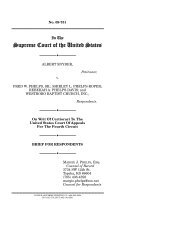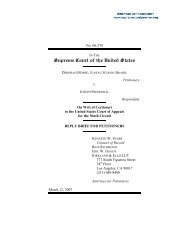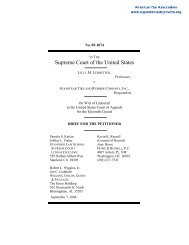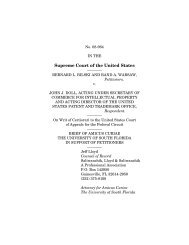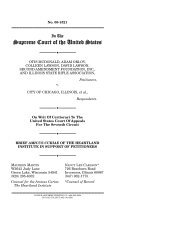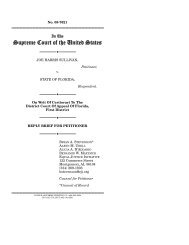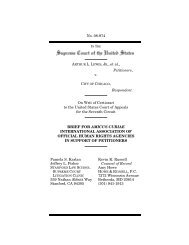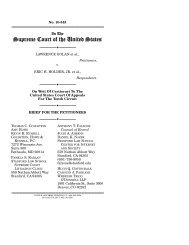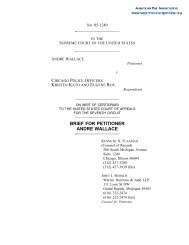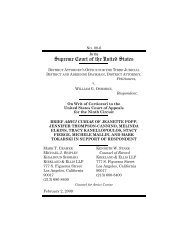Brief of respondent for Florida v. Powell, 08-1175 - Oyez
Brief of respondent for Florida v. Powell, 08-1175 - Oyez
Brief of respondent for Florida v. Powell, 08-1175 - Oyez
Create successful ePaper yourself
Turn your PDF publications into a flip-book with our unique Google optimized e-Paper software.
46<br />
This last sentence could not effectively<br />
convey a right the defendant was never told<br />
he had. In other words, how can a defendant<br />
exercise at any time during an interrogation<br />
a right he did not know existed? The catchall<br />
phrase did not supply the missing<br />
warning <strong>of</strong> the right to have counsel present<br />
during police questioning because a right<br />
that has never been expressed cannot be<br />
reiterated.<br />
JA 172. 15<br />
15<br />
A federal district court in <strong>Florida</strong> rejected a similar<br />
argument. In United States v. Taylor, federal agents reading<br />
from a standard <strong>for</strong>m then used by the Department <strong>of</strong> Homeland<br />
Security, advised the defendants that “[y]ou have the right to<br />
talk to a lawyer <strong>for</strong> advice be<strong>for</strong>e we ask you any questions.” No.<br />
05-60072, at 5 (S.D. Fla. July 26, 2005) (magistrate judge’s<br />
report and recommendation). The magistrate judge found the<br />
warning invalid under Miranda, concluding that most criminal<br />
attorneys, to say nothing <strong>of</strong> “a suspect unschooled in the law,”<br />
would construe the <strong>for</strong>m as impermissibly limiting access to<br />
counsel to the period be<strong>for</strong>e interrogation. Id. at 12. Notably, the<br />
government in that case, like here, argued that other clauses in<br />
the <strong>for</strong>m – a provision providing that “[i]f you decide to answer<br />
questions now without a lawyer present, you have the right to<br />
stop answering at any time” and a waiver provision providing<br />
“[a]t this time, I am willing to answer questions without a<br />
lawyer present” – were sufficient to support a “reasonable<br />
inference” <strong>of</strong> the right to have an attorney present during<br />
questioning. Id. at 6, 11. The magistrate judge rejected the<br />
government’s parsing <strong>of</strong> the <strong>for</strong>m, concluding that the “waiver<br />
portion <strong>of</strong> the <strong>for</strong>m incorporates the statement <strong>of</strong> rights portion,<br />
which sets <strong>for</strong>th the right to counsel be<strong>for</strong>e questioning<br />
only. Moreover, there is no indication in the <strong>for</strong>m that the right<br />
to terminate questioning implies a right to request counsel or<br />
(Continued on following page)



